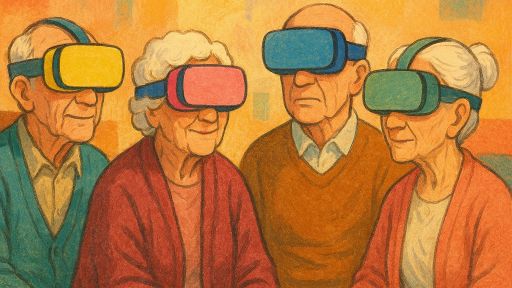
23/04/2025 10:43 am
Reduce Dementia Isolation at Home with Reverie VR
Reducing Isolation for Family Members with Dementia Through Reverie VR at Home
Dementia doesn’t just affect memory—it can also rob a person of their sense of connection to the world around them. As a family carer, one of the most heartbreaking challenges is watching a loved one become increasingly isolated or withdrawn. This emotional distancing can be just as painful as the cognitive decline itself. However, through gentle, immersive technology like Reverie VR, you can help your loved one feel more connected, engaged, and emotionally supported—right from the comfort of home.
The Impact of Isolation in Dementia
As dementia progresses, individuals may lose confidence in social settings, struggle with communication, or become disoriented by changes in their environment. Over time, these challenges can cause them to withdraw from conversations, activities, and even loved ones. Left unaddressed, this isolation can lead to depression, anxiety, and accelerated cognitive decline.
Bringing the World to Them with Reverie VR
Reverie VR is a virtual reality platform that provides calming, immersive 360° visual experiences created specifically for people living with dementia. Whether it’s walking along a quiet beach, strolling through a beloved childhood town, or watching birds in a peaceful meadow, Reverie VR brings comforting and familiar scenes directly to your loved one—helping to reduce feelings of loneliness and rekindle emotional connections.
How Reverie VR Helps Combat Isolation
Creates a Sense of Presence
Virtual reality gives your loved one the feeling of being "somewhere else"—a powerful way to restore a sense of exploration and freedom that dementia can take away. This virtual presence stimulates the mind and lifts the spirit, even when physical outings are no longer possible.
Encourages Conversation and Reminiscence
Reverie VR often sparks memories and stories. Sharing these experiences with your loved one creates opportunities for meaningful dialogue, helping them feel seen, heard, and understood.
Builds Emotional Connection
Spending time together watching calming and nostalgic scenes deepens your bond and provides mutual joy. These shared moments are vital for reducing emotional isolation and reinforcing your loved one’s identity and importance in the family.
Scientific Evidence on Reducing Isolation with VR
Improved Social Engagement:
A study in Frontiers in Psychology found that immersive VR significantly increased verbal and non-verbal engagement in people with dementia, leading to improved feelings of social connection and reduced loneliness (Manera et al., 2016 - frontiersin.org).Enhanced Mood and Communication:
Research published in JMIR Serious Games showed that dementia patients exposed to VR therapy experienced improved mood and emotional expression, particularly in home settings where family interaction was involved (Appel et al., 2020 - games.jmir.org).Reduction in Isolation Symptoms:
In BMC Geriatrics, researchers reported a significant reduction in feelings of isolation among dementia participants who engaged with VR as part of their routine care (Moyle et al., 2018 - bmcgeriatr.biomedcentral.com).
Practical Tips for Reducing Isolation with Reverie VR at Home
Set a Routine:
Incorporate short, consistent VR sessions into the week—such as mid-morning or after lunch—when your loved one is most alert and receptive.Tailor to Their Story:
Choose content that reflects personal interests or life history—old holiday destinations, places they once lived, or environments they’ve always loved.Join Them:
Sit with your loved one during sessions, talk about the scenery, and ask gentle questions that prompt memories or feelings. Your presence enhances the emotional connection.Note Their Reactions:
Keep track of what your loved one responds positively to. This helps you repeat experiences that bring comfort and avoid those that may overwhelm.
Benefits for Family Carers
Strengthens Emotional Bonds:
Shared experiences create moments of genuine connection in the face of cognitive decline.Eases Emotional Stress:
Watching your loved one relax and smile provides emotional relief and reassurance.Promotes Confidence in Caregiving:
You’ll feel empowered knowing you’re offering something truly beneficial—not just physically, but emotionally.
Conclusion
Dementia can create emotional walls—but tools like Reverie VR help break them down. By offering your loved one immersive, familiar, and comforting experiences, you’re not just reducing isolation—you’re bringing them back into the present moment and strengthening the bond you share.
Interested in learning more?
To learn more about how Reverie VR can transform your admissions process and improve resident outcomes, please contact our team for a personalised consultation.

22/04/2025 4:36 pm
Deliver Person-Centred Dementia Care with Reverie VR
Person-centred care lies at the heart of effective dementia support. As a professional carer, your ability to understand each resident’s unique history, personality, and needs is vital to creating meaningful, compassionate care experiences. Yet, in the day-to-day demands of dementia care, it can be challenging to deliver this approach consistently. That’s where tools like Reverie VR come in—offering gentle, immersive experiences that help you connect more deeply with each individual and deliver person-centred care with confidence and ease.



Get in touch & book a demo
For more information or to arrange a free demo please get in touch by pressing the button below.
